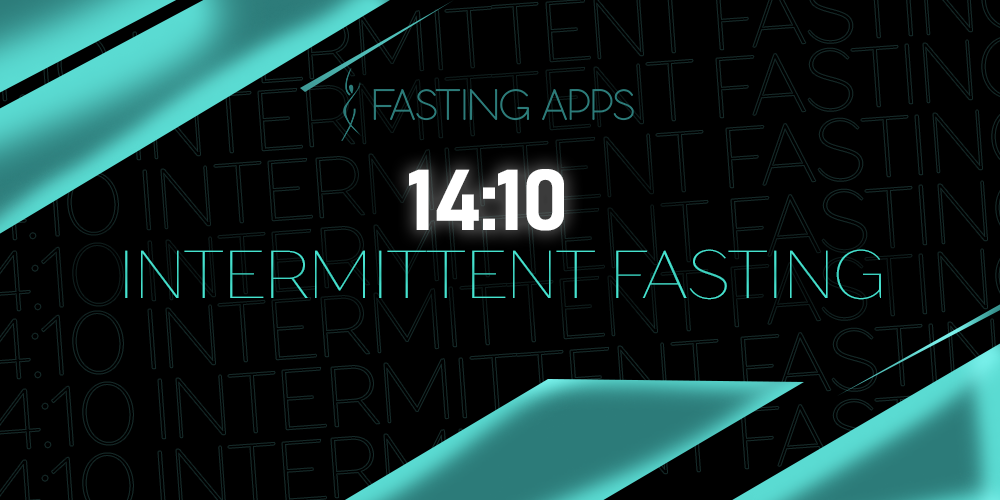14:10 Intermittent Fasting

I’m sure we’ve all heard of the 16:8 intermittent fasting method. It’s one of the most popular fasting methods around and is typically regarded as one of the easiest to grasp for new intermittent fasters. However, it’s not always feasible as your schedule can fluctuate and shift. For some, a 16-hour fast is still just too much to adhere to.
With the 14:10, your day no longer has to revolve around when you’re allowed to break your intermittent fasting. The 14:10 is a much more accessible intermittent fasting method that allows you 10 hours every day to eat and 14 hours to fast. Instead of cutting out an entire meal like with the 16:8, you’re cutting out an evening snack.
But what is the 14:10 intermittent fasting method beyond the hours? Let’s take a look at what you can expect from this intermittent fasting plan and how it affects the body. Here is a closer look at the 14:10 intermittent fasting method.
Key Takeaways
- The 14:10 method allows you to eat for 10 hours and fast for 14 hours.
- Winding down before the fast is important, as overeating can make fasting more difficult.
- Be mindful of what you eat throughout the day, not just during the eating period.
- Water, unsweetened tea, and coffee are acceptable drinks during the fast.
- Supplementing food with drinks can help satiate hunger during the fasting period.
Breaking Down the 14:10
The 14:10 is easily broken down into four sections: Eating, winding down, fasting, breaking fast. This is one of the best intermittent fasting methods for someone who has an early start to the day almost every day of the week. You can start your eating with breakfast around 6 or 7 am and then continue eating well into the evening. Depending on when you started, you can end your eating day with either an early dinner or a late afternoon snack.
Winding down is when you lessen the food and drinks that you put into your body so that you’re not stuffed when the fasting starts. If you overeat throughout your window of eating, your body will have a tougher time breaking everything down while fasting. That’s why winding down is so important.
Once your 10 hours of eating is up, it’s time to start fasting. For 14 hours, you shouldn’t be eating anything and limiting yourself on what you can drink. This gives your body time to break down the calories from the day and to start breaking down fats.
As the fast starts to come near its end, it’s recommended that you ease your body back into eating. Don’t stuff yourself in the morning as this could shock your system and lose all of the progress from the 14-hour fast. Eat gentle foods to wake your system up and return it to the eating phase.
Be Mindful of What You Eat
As with breaking your intermittent fast, eating throughout the day should be mindful. There is a mindset that when you’re intermittent fasting, you can eat whatever you want throughout the day as long as you fast at the end. While there is some truth to this, there are still bad calories that can be tough to break down. Don’t go around eating three meals of fast food every day and expect to notice progress.
Be aware of what you’re putting into your body and how it will effect your system. Eating greasy food is still going to be harmful to your system, even if you’re giving it more time to process. Fruits, vegetables, meats, grains should all be monitored throughout the day.
Drinking While Fasting
When you’re fasting, there are a few things you’re still allowed to have. Fasting is all about cutting back on eating and drinking items with poor nutrients and high calorie counts. However, certain drinks are still okay to have during the fast. Water, unsweetened tea, and coffee are all acceptable drinks during your fast.
In fact, many experts recommend supplementing food with drinks as oftentimes this can help satiate hunger.
FAQ
 What is 14:10 intermittent fasting?
What is 14:10 intermittent fasting?
14:10 Intermittent Fasting is a method of intermittent fasting where a person fasts for 14 hours and then has a 10-hour window to consume their daily meals. This method is also known as the "daily fasting method" or "time-restricted eating." The 14:10 fasting schedule can be adjusted to fit a person's lifestyle, but it is recommended that the fasting window includes the time a person sleeps to make it easier to adhere to. For example, a person might stop eating at 8 pm and then resume eating at 10 am the next day, effectively fasting for 14 hours. This method is considered one of the easiest and most sustainable ways to start with intermittent fasting.
 Is 14 10 a good intermittent fasting?
Is 14 10 a good intermittent fasting?
Yes, the 14:10 intermittent fasting method can be a good option for those looking to try intermittent fasting.
 How much weight can you lose in a week on a 14 10 fasting?
How much weight can you lose in a week on a 14 10 fasting?
The weight you can lose in a week with 14:10 fasting depends on various factors such as calorie intake and physical activity.
 How long does it take to see results from 14 10 intermittent fasting?
How long does it take to see results from 14 10 intermittent fasting?
The time it takes to see results from 14:10 intermittent fasting can vary, but some people may see changes in a few weeks.
 Is it OK to fast for 14 hours everyday?
Is it OK to fast for 14 hours everyday?
Fasting for 14 hours every day can be safe for most healthy adults.
 Is fasting 14 hours a day healthy?
Is fasting 14 hours a day healthy?
Fasting 14 hours a day can be healthy, but it's important to ensure you're getting enough nutrients during your eating period.
 Is 14 hours fasting as good as 16?
Is 14 hours fasting as good as 16?
Fasting for 14 hours may not be as effective for weight loss as fasting for 16 hours, but it can still be beneficial.
 Should I fast 14 or 16 hours?
Should I fast 14 or 16 hours?
Whether to fast for 14 or 16 hours depends on your personal preference and lifestyle.
 What are the results of 14 10 fasting?
What are the results of 14 10 fasting?
The results of 14:10 fasting can vary, but some people may experience weight loss, improved digestion, and other health benefits.
 What are the side effects of 14 hour fasting?
What are the side effects of 14 hour fasting?
Possible side effects of 14-hour fasting can include hunger, headaches, and low energy, but they are usually temporary.
 Can you drink water on 14 hour fast?
Can you drink water on 14 hour fast?
Yes, you can and should drink water during a 14-hour fast.
 What is 14 hours fasting called?
What is 14 hours fasting called?
14-hour fasting is also known as the 14:10 intermittent fasting method.
 What should I eat when breaking my 14 day fast
What should I eat when breaking my 14 day fast
When breaking a 14-hour fast, it's best to start with gentle foods and avoid overeating.
 Does fasting for 14 hours burn fat?
Does fasting for 14 hours burn fat?
Fasting for 14 hours may help burn fat, but weight loss depends on calorie intake and physical activity.
Written By Andrew Brewer
Andrew Brewer started FastingApps to give people the guidance that he never received when he was first starting. His goal is to make your goals achievable and to offer you only the best fasting apps that the internet has to offer. You're not on your own - Andrew and the entire family of reviewers at FastingApps are here with you every step of the way!

 What is 14:10 intermittent fasting?
What is 14:10 intermittent fasting?